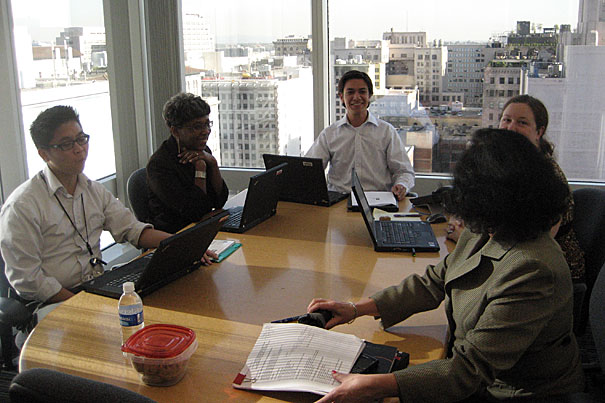
Antonio Sweet ’13, an engineering sciences concentrator, returned home to Los Angeles so he could explore his interest in energy and infrastructure through an internship at one of the state’s public utility companies.
Courtesy of Antonio Sweet
Breaking away
Time elsewhere between semesters helps students to recharge
Cheryl Best works hard, even by Harvard standards. The College junior takes a full courseload each semester to fulfill the requirements of her concentration, psychology, and her secondary field of study, the classics. During the week, Best is a research assistant at Harvard’s Social Neuroscience and Psychopathology Lab, where she aids a study of the relatives of people diagnosed with schizophrenia. On weekends, she puts in two eight-hour shifts with the mentally ill at McLean Hospital. An independent student, Best picks up extra cash working late nights as assistant manager at the Quad Grille.
But when Winter Break came around, Best decided to go home to Arizona and do something really difficult for most Harvard College students: slow down.
“When I got back from school, I did a lot of sleeping and lounging around,” Best said. “I was so busy during the semester — working at least 40 hours a week at three different jobs on top of being a full-time student — that it felt unbelievably good to do nothing. Since then, I’ve been reading fun books rather than textbooks, baking, and going on rides out in the desert with family.”
College officials applaud students like Best, who choose to spend Winter Break away from campus, where they can recharge and reconnect with loved ones. The officials say that the “nothing” that undergraduates often think they’re doing — sleeping, eating well, having fun, and tending to relationships — is actually vital for academic success, and for physical and mental health.
“The academic year at Harvard is rigorous,” said Suzy Nelson, the College’s dean of student life. “When a student comes, they dedicate their mind, body, and spirit to learning. We see how many activities that our undergraduates are involved in. It’s exhilarating, but it can also be exhausting. All people, if they’re thinking about staying well and healthy, need to take a break.”
Paul Barreira, director of behavioral health and academic counseling at the Faculty of Arts and Sciences, said he and his colleagues at Harvard University Health Services supported the adoption in 2009 of a new academic calendar, in part because it gave students substantial time off between semesters. He said the old calendar left undergraduates barely a moment to catch their breath.
“With the old schedule, classes would end before the holidays, but students still had lab reports and papers to work on, then two weeks of exams,” he explained. “Maybe you got a few days off for intersession, but there was no meaningful break. Now students finish the work, go home, and have four weeks with no pressure. They can do the things that they enjoy.”
Like many of her classmates, Best enjoys spending Winter Break off campus, resting and reconnecting with family and friends back home. Other undergraduates use the time for research or to gain career experience in ways that wouldn’t be possible during the academic term. Antonio Sweet ’13, an engineering sciences concentrator, returned home to Los Angeles so he could explore his interest in energy and infrastructure through an internship at one of the state’s public utility companies.
“I’m working for Sempra in their downtown offices,” Sweet said. “I look for and evaluate suppliers owned and operated by minorities, women, and/or disabled veterans in order to give them an equal opportunity to bid for contracts with Sempra. I’m learning a lot about the real world application of my studies, and getting my foot in the door with a company I really want to work for this summer.”
Sweet said that because Sempra’s offices are close to home, he also has time for trips to the beach, for all-you-can-eat barbecue in Koreatown, and for playing with his newborn niece. Barreira said students like Sweet often find that Winter Break gives them a chance to do something different.
“We’re giving them a month,” Barreira said. “We hope they spend much of that time visiting family, free from pressure. But if there are other things that pique their curiosity, then go do it. There are no requirements. It’s different than being here for reading week and to finish up course work.”
Best and Sweet both say that the time they spend off campus will pay dividends when they return. Sweet knows that some of his classmates will come back early for Wintersession (Jan. 13-22), and he’s impressed by the programs and activities that will be offered during that period. He has chosen to stay in Los Angeles, however, because the job experience at Sempra will make his summer planning much less stressful.
“While many of my friends are doing on-campus activities that seem like a lot of fun, I know I’ll be able to have a great time with them during the semester,” he said. “Right now, I enjoy being with my family and friends while doing meaningful projects for a great company that I hope makes me a better job candidate in the future.”
Best admitted that she’s getting a bit antsy in Morenci, the small Arizona mining town that is home, but said that time away from Harvard increases her appreciation for her College experience. It also makes her eager for the semester’s start.
“I live in a small, sheltered community, and I never thought I would have the opportunities in life that I have now,” she said. “Being home takes me to a home within myself, where I can remember why I enrolled at Harvard in the first place and what my goals in life truly are. It helps me to remember my values and my experiences a little better, and to appreciate the amazing experiences I do have at Harvard more after realizing how truly rare and incredible they can be.”




